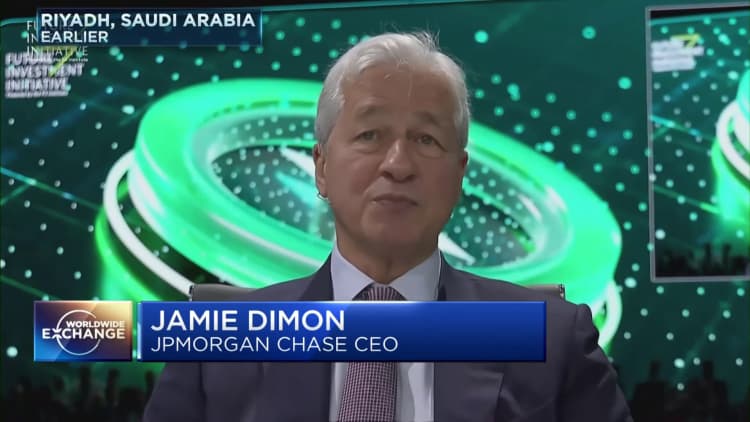Jamie Dimon, chairman and chief executive officer of JPMorgan Chase & Co speaks on September 25,2019 in New York, US.
Misha Friedman | Getty Images News | Getty Images
JPMorgan Chase CEO Jamie Dimon is asked routinely where he sees the greatest threats to the global economy — and to mankind in general. Speaking on a panel in Riyadh, Saudi Arabia, the veteran financier stressed the gravity of the spread of nuclear weapons, which he placed ahead of climate change and other widely-referenced threats.
“I hear people talking about ESG all the time,” Dimon said Tuesday, referring to the environmental, social and governance concerns and mandates for governments and companies.
“I just would put on your table the most serious thing facing mankind is nuclear proliferation. If we’re not sitting here 100 years from now, it will be nuclear proliferation. It’s not our climate.”
International bodies and proliferation experts warn that the danger of nuclear weapons use is higher than it’s been in decades, amid wars involving nuclear powers like Russia and the weakening of adherence to international nuclear treaties.
“The risk of a nuclear weapon being used is currently higher than at any time since the depths of the Cold War,” the United Nations wrote in a statement in March 2023.
It said that the Russia-Ukraine war represents “the most acute example of that risk,” and that “the absence of dialogue and the erosion of the disarmament and arms control architecture, combined with dangerous rhetoric and veiled threats, are key drivers of this potentially existential risk.”
Russia meanwhile is revoking its ratification of the Comprehensive Nuclear-Test-Ban Treaty (CTBT), which the Carnegie Endowment for International Peace calls “one of the most consequential international agreements for global security.”
The CTBT, which was opened for signatures in 1996, prohibits “any nuclear weapon test explosion or any other nuclear explosion” anywhere in the world. It was signed by 187 nations and ratified by 178, but cannot officially come into force until 44 specific countries ratify it, including China, the United States, North Korea, India, Israel and Iran. Still, no country has carried out nuclear testing since the CTBT opened for signatures, except North Korea.
Iran, meanwhile, has for the past few years ramped up its uranium enrichment to what the International Atomic Energy Agency says is an “alarming” level, and Saudi Arabia’s Crown Prince Mohammed bin Salman has vowed to develop nuclear weapons for his country if Iran does, sparking fears of a Middle Eastern nuclear arms race.
Earlier in October, Dimon said in a statement that came with JPMorgan’s earnings release that “this may be the most dangerous time the world has seen in decades.”
In addition to the wars in Ukraine and the Middle East, Dimon cited — as he did again in Riyadh — the surging national debt and “the largest peacetime fiscal deficits ever.”
“I’ve been generally an optimist,” Dimon said on the panel, but added: “I think you’d be foolish not to look at some of these things taking place today in Ukraine, the Middle East – obviously my heart goes out for Ukraine, but also it’s affecting oil, food, food prices, gas prices, migration, potential starvation – it’s probably the most serious thing we’ve faced.”


